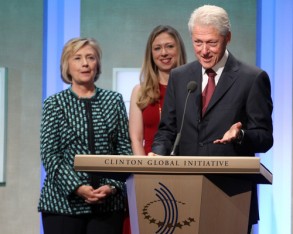
An internal Clinton Foundation “Governance Review” memorandum uncovered in the recent email releases from Wikileaks appears to confirm many of the suspicions critics of the global charity have raised for years. By 2012, the Clinton Foundation had become dominated by loyal Clinton “insiders” that had failed to implement even the most basic oversight protections charities are required to have in place — especially in dealing with conflicts of interest.
The review was conducted at the end of 2011 by Simpson Thacher & Bartlett, a law firm based in New York. According to the memorandum, the law firm was hired to “conduct a decadal governance review of the William J. Clinton Foundation (the “Foundation”) and its relationship with its affiliates (collectively, the “Charities”).” The law firm interviewed employees, corporate officers, and members of the Foundation’s Board of Directors in the course of its review. Afterwards, the law firm released a devastating set of findings and recommendations that paint a brutal portrait of a multi-million dollar tax-exempt organization without proper leadership or direction.
The memorandum describes how a “knowledgeable, committed board of directors is the strongest protector of a charitable organization’s accountability to the law, its donors, consumers of its products and services, and the public.”
Yet, the review’s findings appear to show the Clinton Foundation Board was failing miserably in upholding even its most general duties. Despite rules requiring at least two formal board meetings per year, the Foundation board held one meeting that did not cover strategic or budget planning. The Board often failed to sign the meeting minutes and even used “cloned” minutes from year to year. In addition, the review found the Board lacked strategic oversight and had “not engaged in any succession planning and has not discussed the Foundation’s sustainability if the President is no longer involved.”
The Foundation Board was equally bad, if not worse, with its financial oversight duties.
According to the memorandum, one of the most important duties of the Board is to set and supervise the compensation of the CEO. Yet, the Foundation Board had no role in setting the compensation of the Foundation CEO.
“The Board does not appear to supervise, set compensation for, or evaluate the CEO,” the memorandum states. “Although the Governance Policy requires that the CEO’s performance be formally evaluated every two years, we believe the last formal evaluation may have occurred in 2007. The Board does not appear to set the CEO’s salary.”
Perhaps the most serious matter raised in the review is that the Foundation Board had not implemented or followed its own policy for conflict of interest — even after they became aware of potential conflicts.
“The Foundation indicated on its 2010 Form 990 that it has a written conflict-of- interest policy, requires annual disclosure of potential conflicts of interest, and monitors and enforces compliance with the policy,” the memorandum states. “However, we did not find evidence of that enforcement.”
The memorandum also states, “In addition, some interviewees reported conflicts of those raising funds or donors, some of whom may have an expectation of quid pro quo benefits in return for gifts.”
This arguably suggests that the Foundation Board was aware of some donors expecting to receive favors in exchange for gifts — something that would be a blatant violation of the state and federal laws governing the charities.
In fact, philanthropy expert Charles Ortel discussed this specific scenario with the Daily Caller and said, “This was bright line illegal.” Ortel further described his overall assessment of the memorandum as describing a scenario at the Clinton Foundation that “appears to be a case study in charity fraud.”
READ the Review:
Clinton Foundation Internal Governance Review by LawNewz on Scribd